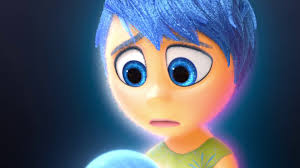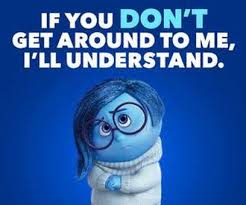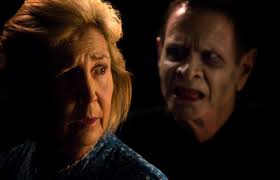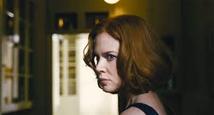I hope that I can elaborate my thoughts here completely and effectively, but I still doubt myself because this film is entirely based on ideas, and though I do love myself some ideas, they and my thoughts, like all beliefs, are hard to discuss. I can agree with so much of the popular sentiment for this movie, but yet...despite all the originality and invention entailed, why did it leave me feeling so empty? As said in Matt Zoller Seitz's review, "It's worth pointing out here that all these characters and locations, as well as the supporting players that we meet inside Riley's brain, are figurative." I think beginning with that statement I should attempt to discuss my opinions.
It is neat how all the characters called emotions interact. Weirdly, the emotions can feel different emotions. Yet I couldn't delete nor distill my suspension of disbelief. The emotions may represent Riley, but in a way they are their own characters. THEY are the main focus of the film, not Riley. They may be part of her, but for some reason I didn't feel like they were of the same mind, with instead the emotional characters playing voodoo with her feelings.
The movie tells a simple tale, yet everything about it is symbolic. The cartoon representations of reality make the WHOLE thing feel surrealy unreal. These imaginary "things" are emblems, the whole thing feeling like some knowing gimmick, nowhere being more evident than the finale sequence where all types of peoples' and animals' emotions are shown, proving to be a new kind of blooper reel. Everything is spelled out too easily, making it feel as if the film is winking at us the whole time.
We are able to tell EXACTLY what is going on in these people's heads, but that's not necessarily a good thing. Since we already know them, there's no room for a surprising emotional connection to them. The filmmakers do try to make the film relate to the audience and its shared experiences, which is greatly appreciated, but there are too many winks and laughs, and not enough genuine frictional contact for my taste. Pixar is known for its emotional touches, and here it basically announces, "You like emotions, we'll give you emotions!"
Past Pixar escapades, though being grandiosely unrealistic in their own rights, had characters that could grow and change subtly with time. Mike of "Monsters Inc.", a poor sop who was never really fully appreciated, went from being a single, strict cog in a wide sea to an emotionally more acute soul, changing the way he thought and behaved after bonding with a sweet little girl who was just as much an outcast in his world as he was. Sulley came to realize that his job wasn't really what mattered to him, it was the relationships it had helped him develop. The emotions in "Inside Out", both as characters and what the film produces as a whole, though able to learn from each other, are still that: single emotions. The memories, and thus' Riley herself, are layered, but the main talking faces on screen can't "really" change. The jokes are everywhere, punch you in the gut briefly, and then dash away, only to be replaced with another one mingled with a brief action set piece. The emotional scenes near the end of the film are able to be seen coming, since we, after all, can SEE the emotions, but the call to jump to those scenes just comes out of nowhere and never really sinks in. Since the story is simple, there is no room for the filmmakers to do anything challenging. Look at one of the studio's magnum opuses, "Up". The first ten minutes or so of that film did something uniquely different: they tapped into the audience's deepest wells of fear and regret, strikingly playing the most tear-inducing material at the BEGINNING. Why? Because the whole film was about healing. This new Pixar film approaches the subject of healing also, but it demonstrates something we already knew: tears can heal. Carl faces a far more pressing problem that is more real to all of us: when we live in a world that's always mourning, and where tragedy never ceases to lurk and strike, how can it be possible to grow in the darkness and feel again? Most Pixar shows appear kiddish and are based in fantasy worlds, but actually have deep, mature agendas with thoughts and ideas grounded in reality. I'm not trying to hold "Inside Out" up (or down) to these other films to show its faults; what I'm trying to do is demonstrate what it should have LEARNED from them. This newest Pixar offering is conceptually complex, even taking place in the REAL WORLD, but in order to appeal to the younger audience, the ideas are toned down enough so that, frustratingly, adults are able to figure out what the themes going to be explored are and how the film might develop itself ahead of time, the movie itself living internally like a fantasy.
The premise is cooky, and brilliantly so, but it doesn't speak at as great an involving, moving volume as it should.
I felt bad when leaving the theater. At first my reasoning wasn't that the film didn't do what it should have, but that I hadn't tried hard enough to enjoy it, as would be evidenced by all the grinning people surrounding me as we stood up and exited the theater's lovable concert hall. "Why can't you understand what makes a film good, boy?" my head kept demanding of me. "Why do you have to be so difficult? Why do you have to be so different? Why can't you enjoy this? Why can't you UNDERSTAND this? Why can't you understand that? Why do you always have to be this way? Why? Why?! WHY?!" Then it hit me like a knocking rock to the head. If I cared that much about a film's conceptions to torture myself like that, were my opinions about it really being difficult? Didn't that mean that I put as much thought into what the film was made of as anybody else did? Isn't an opinion a revelation? A little speck of seasoning timidly popping out from the swirls of porridge around it, where the bead doesn't necessarily make the mix any better, but doesn't, for that matter, make the thing any worse or weaker either? Every drop of the stew makes up the whole broth that one enjoys, and while one may agree that the liquid is what pleases you the most, it is the seasoning that makes the thing special.
You all may enjoy this film. It splendidly matters a great positive deal that you do, but I shan't change, and never shall I hold my opinion over yours. For though I may add a spark to the porridge's tasteful ignition, it is, after all, YOU who matters most.








 RSS Feed
RSS Feed
